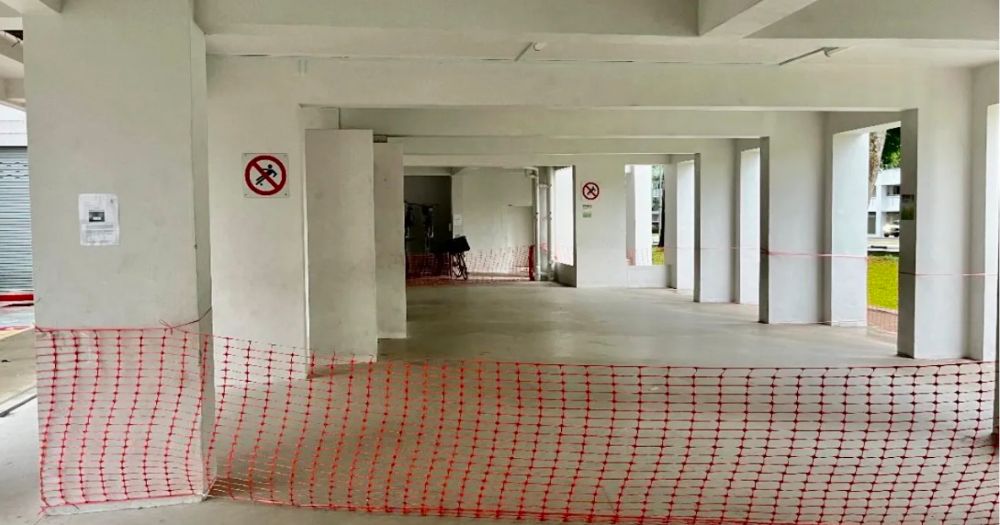There have been 27 instances of town councils (TCs) temporarily closing recreational facilities or restricting their opening hours in the past three years due to feedback from residents on issues like noise nuisance.
In a written reply to questions filed in parliament on Feb. 5, 2024, Minister for National Development Desmond Lee shared more about measures to address persistent disruptive behaviour by inconsiderate users of common spaces.
The questions were raised after some common space closures, such as the barricading of void decks and street soccer courts, came into the spotlight in the media.
Closing spaces is a "last resort"
Lee explained that the TCs manage and maintain common spaces in HDB estates, including recreational facilities like seating areas, game courts, and pavilions.
In the past three years, there have been 27 instances in which TCs have temporarily closed recreational facilities or restricted their opening hours due to feedback from residents on disamenities such as noise nuisance.
Lee said that when TCs encounter persistent disruptive behaviour, they typically post advisories to educate these users at the facilities.
If the misuse persists, TCs would then seek the assistance of grassroots leaders to jointly advise these users, he explained.
Lee added that restricting the use of the facilities at specific hours is done as a "last resort".
This may be done by adjusting the timing of the facilities' lighting or locking them up at night.
If disruptive behaviour persists, TCs may enlist the support of the Singapore Police Force and other relevant government agencies, such as NParks and NEA, to address the issue caused by inconsiderate users.
Encouragement through social media and campaigns
To encourage considerate use of common spaces, there are posters and educational content on social media platforms and Digital Display Panels put up by TCs, Lee shared.
He added that "neighbourliness" is also promoted through various community events, campaigns, and outreach done by MCCY, the People’s Association, the Singapore Kindness Movement, HDB, and the Municipal Services Office (MSO).
Lee encouraged all members of the public to be considerate when using shared facilities in their estates, saying that these spaces play a pivotal role in bringing residents from all walks of life together and building closer neighbourly ties.
"We should be mindful that there are different needs from various groups in our community. We need to adopt a give-and-take spirit and be willing to accommodate the needs of others to build a more harmonious and inclusive community," he said.
Noise threshold for neighbourhood noise
Separately, MP Pritam Singh asked if the ministry will implement the Community Advisory Panel on Neighbourhood Noise's recommendation on a quantitative noise threshold to help assess egregious cases of neighbourhood noise.
Lee replied that the review on establishing a residential noise threshold is ongoing.
"The MSO is partnering with researchers from the Nanyang Technological University (NTU) to determine if noise thresholds adopted elsewhere are relevant to the Singapore context and, if so, how they could be applied practically in regulation and dispute resolution," he said.
The review is expected to be completed by the end of 2024.
Government looking at making mediation mandatory for certain disputes
The government is also looking at making mediation mandatory for certain cases of disputes, said Minister for Law K. Shanmugam said in a separate written reply.
"To further strengthen the community’s capacity to resolve disputes, MinLaw (Ministry of Law), MND (Ministry of National Development), and MCCY (Ministry of Culture, Community and Youth) are looking at mandating community mediation for certain categories of cases, as part of our review of the Community Dispute Management Framework (CDMF)," said Shanmugam.
He shared that frontline officers could mandate mediation for certain types of community disputes, such as long-drawn or escalated disputes between neighbours.
He added that they are also considering mandating re-mediation for cases where disputes resurface after previously arriving at amicable resolutions.
Some concerns, including the risk of potential retaliation, and abuse by those insisting on mediation without genuine intent to resolve the dispute, were raised during public engagement on the CDMF, Shanmugam said.
He added that the government is studying the feedback and ways to address the concerns.
More details on the proposals to introduce mandatory mediation for suitable cases will be shared in due course, he said.
Top photo from The Monitor
If you like what you read, follow us on Facebook, Instagram, Twitter and Telegram to get the latest updates.



